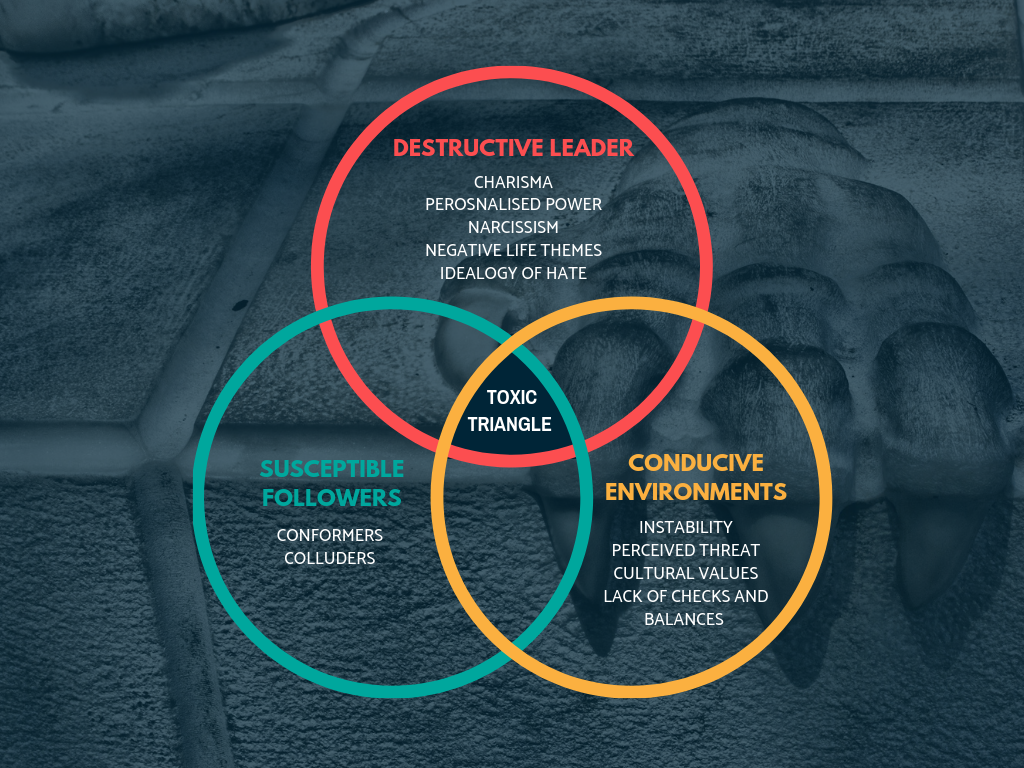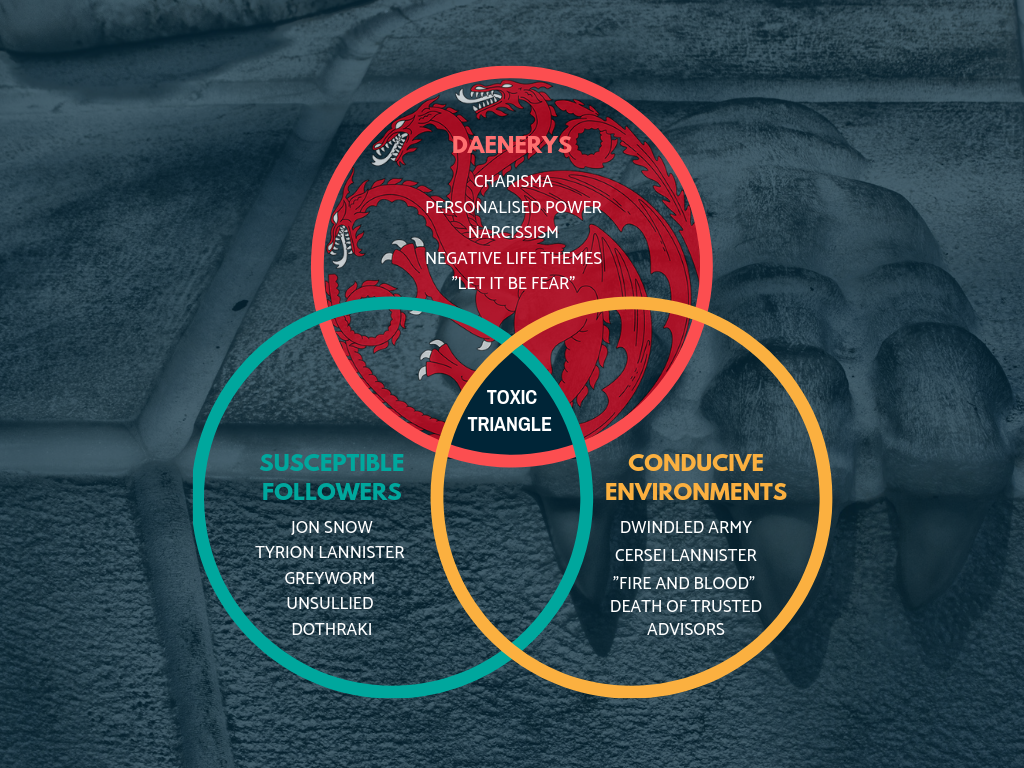To celebrate the final season of the hit HBO series, we are exploring leadership styles of the (surviving) contenders to the throne, and the lessons they can teach us about leadership in the real world.
To celebrate the final season of the hit HBO series, we are exploring leadership styles of the (surviving) contenders to the throne, and the lessons they can teach us about leadership in the real world.
When Season 8 of the show began, we all knew that at least two key characters were on a direct collision course: Cersei Lannister and Daenerys Targaryen. Both are self-made Queens who are vying for the same position, to be the ruler of Westeros and the Seven Kingdoms. Most of us were rooting for the Mother of Dragons to win, but would Dany really have been a better leader compared to Cersei? As the tragic final two episodes of the season indicate, that may not be the case.
So how did we get here? Now that we’ve had time to let the finale sink in, let’s explore Dany’s leadership journey.
Fire and Blood – The Authoritarian Leader of Westeros
According to leadership research, Authoritarian Leadership refers to “a leader’s behaviour of asserting strong authority and control over subordinates and demanding unquestioned obedience from them”. They demand their followers to achieve their best performance, and often are the sole decision-makers for their team. Does that sound like anyone we know?
Lesson 1: Authoritarian leaders do not listen to input from others
Authoritarian leaders decide alone, give orders to staff and expect them to carry them out, based on unilateral, top-down communication. This style of leadership, characterized by one-way communication channels, suggests that authoritarian leaders are mostly not interested in feedback, and that followers do not have influence and control over the decision-making process.
At times, Dany is guilty of this. In episode 6 of Season 7, Tyrion Lannister, the Hand to the Queen, raised the topic of succession. Who will replace Dany if she falls in battle? Tyrion advised Dany to determine a method to select her successor in the event of her untimely death (as she is unable to have children), in order to ensure that her legacy and mission lives on. Dany refused to consider his suggestion, demanding Tyrion to start thinking “short term” instead.
However, Dany has also demonstrated a willingness to listen to advice when necessary. When Cersei’s army destroyed the Tyrells of Highgarden – Dany’s newfound allies – she was furious, and dead-set on bringing her dragons to Kings Landing to burn Cersei’s entire city down. But in a surprising move, Dany actively solicited advice from someone outside her circle, Jon Snow, on what she should do instead:
Upon hearing Jon’s advice, Dany settled on a compromise. Instead of burning down Cersei’s kingdom and killing the innocent people who in the city, Dany chose to attack the Lannister army on the battlefield instead – far away from the everyday people of Westeros.
The authoritarian leadership style isn’t inherently negative; when utilised correctly, this style of leadership can be liberating for people who work well with clear directives under leaders who understand exactly what people do and why their roles are important.
Lesson 2: Authoritarian Leaders get things done and take decisive action.
By requiring subordinates to obey their rules or face punishment if they do not follow orders, followers are a likely to gain a better understanding of what they should do or should not do as a team member. As a result, authoritarian leaders are likely to enhance followers’ sense of identity as group members, in terms of their attitudes and behaviour, which further motivates employees to perform at a high level. Research also suggests that authoritarian leaders are likely to achieve operational performance by fostering a highly centralized decision-making structure.
For a key example of this, look no further than the scene where Dany earned her “Breaker of Chains” title, one of the most iconic moments of the show’s history. When faced with the decision on whether she should buy an army of Unsullied soldiers from a slave owner, Dany was consistently counselled against it by her two closest advisors, Jorah Mormont and Ser Barristan Selmy. However, Dany decided to make an executive decision of her own instead: She agreed to trade one of her dragons for the Unsullied army, as well as their translator, Missandei. You remember what happened next:
It was a decision that her followers were not privy to, but it was one that led her to free a whole city of slaves, and garnered her the undying loyalty of the freed Unsullied soldiers.
Authoritarian leadership can be effective when the organization or team is in a state of constant flux, and the nature of work requires instant decisions during stressful situations. They drive team results by providing clear expectations for what needs to be done, when it should be done, and how it should be done. Dany, to her credit, has demonstrated in the past that she knows when to listen, and when to disregard advice in order to make her own judgements. In fact, her right-hand woman Missandei explains it best:
Missandei has been one of Dany’s closest confidant throughout the series, so it makes sense that her death was the catalyst the show deployed to kickstart Dany’s descent into violence, and to turn her typically effective authoritarian leadership style into a toxic one instead.
Lesson 3: Authoritative Leaders may become toxic when utilised in the wrong context
Toxic leadership is evident when leaders demonstrate aggression towards their employees’ personalities and abilities. A leader is considered toxic if they create serious long-term harm to their followers, and common characteristics shared among toxic leaders include ethical failure and neurosis, both of which were exhibited by Dany when she decided to violate her principles and burn down a whole city of innocent people (ethical failure), and her off-kilter reaction when Jon Snow confronted her about her actions (neurosis). But how did it come to this?
Psychological research has proposed the Toxic Triangle as the characters of leaders, followers, and environmental contexts that allow for destructive leadership to thrive:

The first component of the toxic triangle is associated with the Destructive Leader, which is determined by the leader’s Charisma, their need to utilise power for personal gain (Personalised Power), their sense of entitlement to their power (Narcissism), their tendency to speak about themselves in terms of negative life stories (Negative Life Themes), and their worldview of vanquishing rivals and destroying despised enemies (Ideology of Hate).
The second component of the toxic triangle is associated with Susceptible Followers.Followers play an obviously crucial role in the leadership process, however this model suggests that there are two types of followers that appear to be unable to resist domineering leaders and that inadvertently contribute towards their leaders’ destructive behaviour: 1) Conformers, who comply with destructive leaders out of fear and a desire to meet unmet basic needs (see: Unsullied), and 2) Colluders, who actively participate in the leader’s agenda out of their own self-interest (looking at you, Varys).
The third component is in relation to Conducive Environment – the external context allows for destructive leadership to thrive: instability, perceived thread, cultural values, and the absence of checks and balances.

Let’s explore the conducive environments that led Dany towards her most destructive moment in Kings Landing:
Instability: Her army was significantly dwindled from the Battle of Winterfell (Instability)
Perceived Threat: Cersei Lannister, and Dany’s belief that her own supporters (e.g. Jon, Sansa, Varys, and Tyrion) are trying to undermine her claim to the throne.
Cultural Values: Dany’s strong adherence to the Targaryen Motto: “I will take what is mine, with Fire and Blood”, as well as the Dothraki’s focus on plundering new lands and taking resources by force.
Lack of Checks and Balances: The showrunners have been very intentional with eliminating Dany’s circle of advisors ever since she gained power, from Ser Barristan Selmy, to Jorah, and, ultimately, Missandei. Towards the end of the season, Dany essentially lost everyone she can trust to respectfully oppose her and keep her more aggressive impulses in check.
When we look back at Dany’s journey in Season 8, and we can start to see how aligned she was to the three components of the toxic triangle, the perfect storm that led to her ultimate downfall.
If you would like to know more about toxic leadership, or how you can prevent hiring toxic leaders through the use of psychometric assessment contact us today.










